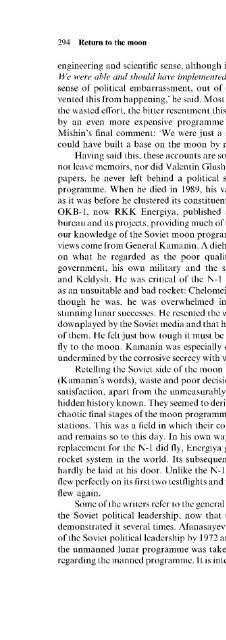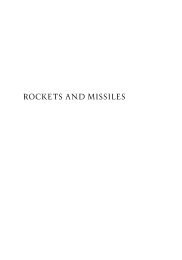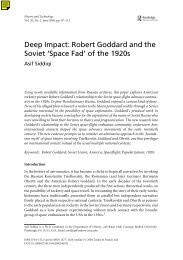Soviet and Russian Lunar Exploration
Soviet and Russian Lunar Exploration
Soviet and Russian Lunar Exploration
Create successful ePaper yourself
Turn your PDF publications into a flip-book with our unique Google optimized e-Paper software.
engineering <strong>and</strong> scientific sense, although it would have been costly [11]. Mishin [12]:<br />
We were able <strong>and</strong> should have implemented such an expedition after the USA. 'Only a<br />
sense of political embarrassment, out of coming second, after the great rival, prevented<br />
this from happening,' he said. Most of all he regrets the cancellation of the N-1,<br />
the wasted effort, the bitter resentment this caused in the industry <strong>and</strong> its replacement<br />
by an even more expensive programme which was ultimately cancelled in turn.<br />
Mishin's final comment: 'We were just a step away from success with the N-1. We<br />
could have built a base on the moon by now without stress or hurry.'<br />
Having said this, these accounts are somewhat one-sided. Vladimir Chelomei did<br />
not leave memoirs, nor did Valentin Glushko. Although Glushko published technical<br />
papers, he never left behind a political statement defending his role in the space<br />
programme. When he died in 1989, his vast Energiya bureau was re-divided much<br />
as it was before he clustered its constituent companies together in 1974. The original<br />
OKB-1, now RKK Energiya, published a vast, colourful company history of the<br />
bureau <strong>and</strong> its projects, providing much of the detail on which an important portion of<br />
our knowledge of the <strong>Soviet</strong> moon programme is based. More critical comments <strong>and</strong><br />
views come from General Kamanin. A diehard Stalinist, his severest criticisms focused<br />
on what he regarded as the poor quality of leadership given by the party <strong>and</strong><br />
government, his own military <strong>and</strong> the space programme leadership, like Mishin<br />
<strong>and</strong> Keldysh. He was critical of the N-1 from the start, which he always regarded<br />
as an unsuitable <strong>and</strong> bad rocket: Chelomei's UR-700 would have been better. Patriot<br />
though he was, he was overwhelmed in unconditional admiration of America's<br />
stunning lunar successes. He resented the way in which they were under-reported <strong>and</strong><br />
downplayed by the <strong>Soviet</strong> media <strong>and</strong> that he could not speak publicly <strong>and</strong> approvingly<br />
of them. He felt just how tough it must be on disappointed <strong>Soviet</strong> cosmonauts not to<br />
fly to the moon. Kamanin was especially critical on how good decision-making was<br />
undermined by the corrosive secrecy with which the <strong>Soviet</strong> lunar programme was run.<br />
Retelling the <strong>Soviet</strong> side of the moon race, with its setbacks, 'gr<strong>and</strong>iose failures'<br />
(Kamanin's words), waste <strong>and</strong> poor decisions, seems to have given these writers little<br />
satisfaction, apart from the unmeasurably important one of making the facts of this<br />
hidden history known. They seemed to derive little comfort from the fact that from the<br />
chaotic final stages of the moon programme, a plan emerged for the building of space<br />
stations. This was a field in which their country became the undisputed world leader<br />
<strong>and</strong> remains so to this day. In his own way, Glushko was vindicated, for in 1987 his<br />
replacement for the N-1 did fly, Energiya giving the <strong>Soviet</strong> Union the most powerful<br />
rocket system in the world. Its subsequent cancellation, for economic reasons, can<br />
hardly be laid at his door. Unlike the N-1 <strong>and</strong> more like the Saturn V, the Energiya<br />
flew perfectly on its first two testflights <strong>and</strong> it was not for technical reasons that it never<br />
flew again.<br />
Some of the writers refer to the general loss of interest in going to the moon among<br />
the <strong>Soviet</strong> political leadership, now that the Americans had achieved the feat <strong>and</strong><br />
demonstrated it several times. Afanasayev [13] said that this was the considered view<br />
of the <strong>Soviet</strong> political leadership by 1972 <strong>and</strong> suggests that the decision to wind down<br />
the unmanned lunar programme was taken at around the same time as the decision<br />
regarding the manned programme. It is interesting that the political leadership of both







